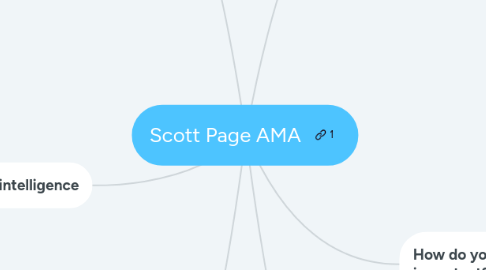
1. How do you get deep?
1.1. Get a general understanding first
1.1.1. Where to apply
1.1.2. What kind of data
1.2. Example: Sales at startup
1.2.1. Use a disease model
1.3. Many orgs have only one model
1.3.1. Budget office
1.3.2. Unfortunate
1.4. Example: Markov models
1.4.1. You can find actual papers applying them
1.4.2. Look at a few to get a sense
1.5. Meta: If you see something new
1.5.1. How to look at it from a different perspective?
1.6. Example: Network models
1.6.1. Example: happens at coffee, diners
1.6.1.1. Doesn't happen in food apps
1.6.2. If you open a branch, that can affect social network
1.6.3. Escalator vs elevator
1.7. Using models will prevent you from making really dumb decisions
2. How do you decide which factors are important?
2.1. UN
2.1.1. Projects should now have sustainability analysis
2.1.2. 40 years ago everything was just economic
2.1.3. Citizen engagement is now important
2.1.3.1. What kind of society are you creating
2.1.3.2. Starbucks app is losing it
2.2. Example: obesity
2.2.1. Many dimensions come into play
2.2.2. How many dimensions to consider
2.2.2.1. depends on the importance of problem
2.2.2.2. Example: self-driving cars
2.2.2.2.1. You have to consider a lot
2.3. Example: butt-ugly printer: when to stop and move forward?
2.3.1. Ask a breadth question
2.3.1.1. Keep asking
2.3.1.2. As long as people are giving new dimensions
2.3.2. Then, ask which ones to go deep on?
2.3.2.1. You can have weights for each dimension
2.3.2.2. It is usually an exponential decay
3. How do you know you're using the right model?
3.1. What if I push the model to extremes?
3.1.1. Example: a long window
3.2. How bad could things get?
3.2.1. Power-law models can get bad quickly
3.3. Good to have a witch's broom (like climate models)
3.4. If you see any trend extrapolate
3.4.1. Grow linearly
3.4.2. Exponentially
3.4.3. Flatten
3.4.4. Grow until a threshold and plateau
3.4.4.1. Expected in Markov models
3.4.4.2. Canada goose models
3.4.4.2.1. You can only sell so many
3.5. Play with models and think about implications
3.5.1. Direct outcomes
3.5.2. Indirect outcomes
4. Collective intelligence
4.1. Depends on 2 things
4.1.1. Repertoire of talent
4.1.2. Repertoire must be diverse
4.2. FS is a community of models
4.2.1. It's good
4.2.2. You need cognitive diversity
4.3. Critical diversity is important
4.3.1. For complex problems
4.3.2. These problems have too many dimensions
4.3.3. Need creative solutions
4.4. Example: uses for a brick
4.4.1. Not just different uses
4.4.2. Different categories
4.5. Your score
4.5.1. How much you do individually
4.5.1.1. Only guy with an idea: 1 point
4.5.1.2. 2 people: 1/2 point
4.5.1.3. And so on
4.5.2. How much you contribute to the group
4.6. Screenplay is now written by teams
5. How do you know when you have the right amount of diversity?
5.1. Complex?
5.1.1. Have more people look at it
5.1.2. In isolation if possible
5.1.2.1. Esp if there are power differences
5.1.3. Runs counter to "checklist manifesto"
5.2. ER
5.2.1. Knee injury?
5.2.1.1. Follow checklist
5.2.2. Complex problem?
5.2.2.1. Consult with many people
5.3. FB, Apple, Android
5.3.1. Platform value comes from 14M developers
5.3.2. Very diverse talent
6. If you're not getting uncomfortable
6.1. You're not in a good place
6.1.1. You will be in a bubble chamber
6.1.2. Conformance
6.2. Good to see different places and cultures
6.2.1. You'll become stale otherwise
6.2.2. Different cultures make different assumptions and priorities
6.3. Think of yourself as a toolbox
6.3.1. What new skills are you acquiring?
